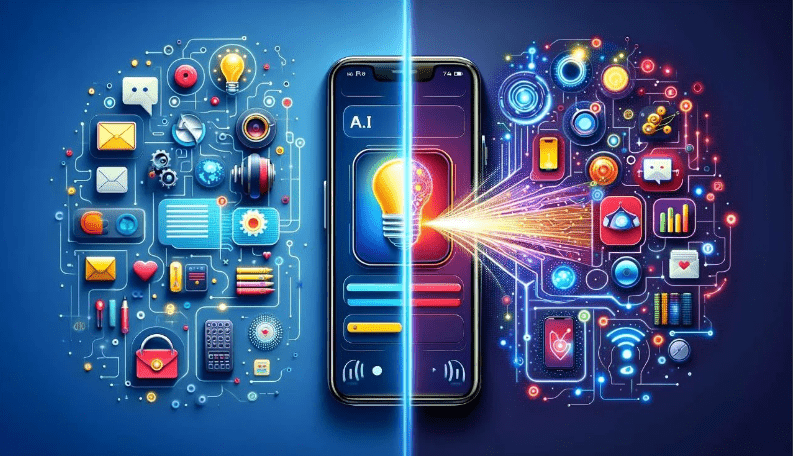The Impact of Artificial Intelligence on Enhancing App Functionality
The growing potential of artificial intelligence (AI) transforms and enforces the app’s functionality. Forbes Advisor indicates that over 60% of businesses believe these technologies improve customer relationships and increase productivity. And we can already witness how software applications have become more user-oriented and personalized by implementing AI into app features.
In business, AI brings unique solutions that help companies stand out. For example, virtual assistants like Siri or Alexa (although they now seem outdated compared to modern breakthrough innovations), facial recognition for authentication, chatbots, or AI-based fraud detection features are now standard for services in various fields. Moreover, they are evolving and, in the future, are expected to provide more advanced solutions for both users and business owners.
In this article, we’ll cover the questions of AI integration in software, its benefits, successful examples, and future perspectives.
The Evolution of AI in App Development
Artificial intelligence and machine learning have entered the world even before the 21st century. The first primitive chatbot, Elize, was released in the 1960s. Employing continuous deep learning, AI in app development has caused the emergence of advanced software features like customized offers or recommended items in the 2000s.
In recent years, the evolution of AI in the software market has shown rapid growth. Technological advancements have brought from 10.1 billion dollars in 2018 to 70.94 billion in 2023. The forecast for the year 2025 is to reach 125 billion dollars.
How AI has changed the app development landscape
With the broader integration of intelligent technologies, software functionality addresses the needs of end users faster and more efficiently. For example, throughout a user journey, AI-powered features like voice recognition and chatbots make that journey smooth and customized. Instead of typing the request, it’s worth saying it and receiving the answer. As well as getting help: there is no need to wait for the customer support team — virtual assistants can provide basic solutions immediately.
Also, predicting users’ behavior became feasible, which leads to better user engagement and more personalized features. Web and mobile applications can offer tailored search results and recommendations based on user personal information.
Key AI technologies employed in app development
For creating enhanced software functionality, the following AI technologies are involved:
- Machine learning (ML). This technology works with data and can process a large amount of it. A developer can train ML models to receive the desired results from data and make precise predictions. The learning algorithms contribute to advanced personalization, customized recommendations, and meticulous prediction.
- Natural language processing (NLP). This part of computer science recognizes human language and can analyze its full meaning. The algorithms of NLP allow app developers to include features of instant translation as well as processing spoken commands and huge amounts of text. NLP is already integrated into chatbots and virtual assistants.
- Computer vision. The scope of work of computer vision is to derive information from images and videos. This technology can process thousands of digital visual materials. You encounter computer vision every time you unlock mobile devices with face recognition.
- Intelligent analytics. AI analytics aims to process big data and receive meaningful information from it. It greatly simplifies data processing procedures for which data analysts would dedicate much time. Intelligent analytics help create predictive patterns based on user behavior analysis.
- Intelligent agents. AI-supported agents refer to technologies that perform autonomous actions. With their integration into software, users can experience closer engagement with a platform and get immediate help from virtual assistants.
The Benefits of Integrating AI into App Development
AI integration offers benefits for both sides: businesses and users. Business owners can profit from many aspects of intelligent technologies, like data-driven decisions or advanced possibilities for customers. Users, in turn, taking advantage of AI, receive more personalized experiences.
Let’s see what app development advantages AI integration offers.
Enhancing the User Experience through AI
With AI technologies, end users can benefit from apps in different ways.
Personalization is the main factor that enforces the user experience we already mentioned. AI can create a customized user journey with precise offers and recommendations based on user actions and behaviors. This also includes such functions as adaptive interfaces and prediction. In e-commerce, a perfect example is Amazon, which provides customers with product suggestions based on purchase and search history.
Another part of the benefits is dedicated to virtual help users can get through online chatbots and virtual agents. This solves the problem of waiting for issue resolution. Users get immediate help, which boosts their satisfaction.
AI-Driven Predictive Analysis in App Functionality
The AI’s technical capability allows developers to get thorough market analysis and gain valuable insights from its forecast. This directly influences business decisions. For instance, if the company decides to enforce control over managing production and inventory balances, ML can analyze the products in demand and advise them to focus on their production.
It is also applicable in application development. AI abilities can detect product usability issues that prevent effective usage of the platform and can offer solutions before the issues become massive bugs.
Case Studies: Successful AI Integration in App Development
The following case studies confirm with real examples how effective integrating AI technologies in app development is.
Case Study 1
One of the app development examples of AI adoption is the major bank of Iceland Íslandsbanki, which decided to reduce the load from customer inquiries through an online chatbot.
This idea came to the bank’s executive director, Logi Karlsson. The main concerns were the difficulty of working with the Icelandic language and determining the nature of queries. The AI chatbot mastered all the tasks successfully. Their virtual assistant, Fróði, has shown significant results, covering 50% of queries exceptionally well online and having a user satisfaction rate of 90%.
Case Study 2
DocQMiner, an AI-based risk advisory app, has become a lifesaver for data analysts. Due to the changes in accounting regulations, companies with lease contracts had to review their documentation, which can be thousands of files. This enormous task can be handled with a virtual assistant, Robin, who gives suggestions to analysts about which information from the contract needs reviewing.
Future Perspectives: AI and App Development
With a perspective on the future, AI has a rising potential for web and app development.
Emerging AI technologies in app development
The future perspectives of AI in software development are built on existing AI tech:
- Innovations in deep learning. Advancements in deep learning will offer a more thorough analysis of users’ needs, behaviors, and preferences. New models will provide better data-driven decisions and more precise forecasts.
- Contextual awareness. Contextual awareness in AI refers to the ability of artificial intelligence systems to understand and adapt to the context surrounding a user’s request or task. Using data like a user’s location, time of day, recent actions, and search history, AI can make customized predictions about what information or suggestions might be most useful to a user at that exact moment. For example, recommending a nearby restaurant at dinner time.
- Predictive maintenance. Along with making predictions of what the users will need, the AI of the future will be able to forecast platform maintenance. Based on the existing functionality and user actions, it will detect bugs before they appear, significantly saving time and money.
The role of AI in the future of app development
AI technologies have a lot of potential to evolve and improve. This is what we can expect from AI’s future tendencies:
- Hyper-personalization. AI is expected to allow for even more customization, like real-time interaction with users, deeper user persona analysis, and more exact user behavior prediction.
- Dominance of voice interactions. AI trends dictate that voice and natural language recognition should become more common. This will cause improvements in accessibility and ease of app usage.
- Increased user engagement. The app development future opens the possibility of immersing users more in interaction with the product. This is done with augmented reality (AR) and virtual reality (VR). Not only will it improve engagement with software, but it will also increase accessibility.
Conclusion
Artificial intelligence allows applications to offer more customized and advanced solutions. Such features as chatbots, virtual assistants, or voice recognition increase users’ engagement with a platform and improve satisfaction. Implementing ML and AI in software development with Sigma.Software makes a product more competitive and efficient.



























